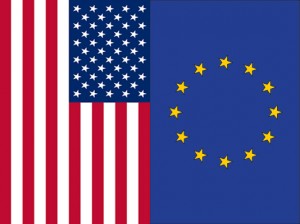 In this year’s State of the Union Address, President Obama announced talks for a Transatlantic Trade and Investment Partnership with the European Union. This agreement will likely include provisions on intellectual property (IP), which are often controversial . If IP provisions are included, they will likely reflect language in existing treaties. Below is a comparison of language between two of the most substantive and recent free trade agreements (FTAs) adopted by the US and the EU for one controversial area of IP: liability for internet service providers (ISP) for infringing content.
In this year’s State of the Union Address, President Obama announced talks for a Transatlantic Trade and Investment Partnership with the European Union. This agreement will likely include provisions on intellectual property (IP), which are often controversial . If IP provisions are included, they will likely reflect language in existing treaties. Below is a comparison of language between two of the most substantive and recent free trade agreements (FTAs) adopted by the US and the EU for one controversial area of IP: liability for internet service providers (ISP) for infringing content.
For both the EU and the US, I have used FTAs with South Korea. The EU-South Korea FTA, “EU treaty,” is the only current EU treaty with provisions on ISP liability. ISP liability provisions are much more common in US FTAs, but the Korea-US FTA (KORUS), “US treaty,” remains one of the most substantive and recent FTAs on the issue.
Summary of Differences
Purpose
The first major difference is the purpose of the sections on ISP liability in both treaties. The US treaty only gives enforcement as the purpose of the section on ISP liability:
For the purpose of providing enforcement procedures that permit effective action against any act of copyright infringement covered by this Chapter, (Korea-US FTA, Art. 18.10(30))
The EU treaty states both enforcement and free movement of information services:
To ensure the free movement of information services and at the same time enforce intellectual property rights in the digital environment, (EU-South Korea FTA, Sect. C, Sub-sect. C, Art. 10.62)
Obligations
The second major difference is between the types of obligations. The US treaty gives an affirmative obligation to provide “legal incentives for service providers to cooperate with copyright owners in deterring the unauthorized storage and transmission of copyrighted materials,” (18.10(30)(a)) and limitations to that obligation. The EU treaty does not provide for enforcement obligations, instead it only gives obligations to limit liability for ISPs.
Scope of Liability Limits
Differences also exist in the types of ISP functions (often known as “safe harbors”) that can be free from liability for infringing content if certain conditions are met. The EU treaty gives three types of ISP functions that can enjoy limited liability: transmission, caching, and hosting. The US treaty has these three functions, but also includes a fourth: location tools. This is reflective of Section 512 of the US Copyright Act. The US treaty also confines the types of ISP functions that are given limited liability to the ones enumerated in the treaty (18.10(30)(b)(i)). The EU treaty does not confine its list of functions.
Conditions for Limited Liability by function for ISPs
Lastly, each treaty gives different types of conditions that must be met for ISP to enjoy limited liability for each function. The US treaty gives conditions that apply to one, a few or all functions. The EU treaty gives separate conditions for each function. Below is a table of summaries of the conditions with links to corresponding texts of the Agreements.
Side-by-Side Comparison
| ISP Function | Korea-US FTA (KORUS) | EU-South Korea FTA |
| Transmission/Mere Conduit | 1. Does not initiate transmission (b) (ii)
2. Does not select material (b) (ii) 3. Does not select recipients (b) (ii) 4. Adopt and implement termination policy (b) (vi)(A) 5. accommodating and not interfering with standard technicalmeasures (b) (vi)(B)
|
1. Does not initiate the transmission 10.63(a)
2. Does not select or modify transmission information 10.63(c) 3. Does not select receiver 10.63(b) |
| Caching | 1. Permits access to cached material (b) (iv) (A)
2. Complies with updating rules (b) (iv) (B) 3. Does not interfere with industry standard technology (b) (iv) (C) 4. Expeditiously removes infringement (b) (iv) (D) 5. Does not initiate transmission (b) (ii) 6. Does not select material (b) (ii) 7. Does not select recipients (b) (ii) 8. Adopt and implement termination policy (b) (vi)(A) 9. accommodating and not interfering with standard technicalmeasures (b) (vi)(B)
|
1. Complies with conditions on access to info 10.64(1)(b)
2. Complies with updating rules 10.64(1)(c) 3. Does not interfere with industry standard technology 10.64(1)(d) 4. Expeditiously removes infringement 10.64(1)(e) 5. Does not modify Information 10.64(1)(a)
|
| Hosting | 1. expeditiously removing infringing material once aware (b) (v) (b)
2. Does not initiate transmission (b) (ii) 3. Does not select material (b) (ii) 4. Does not select recipients (b) (ii) 5. No financial benefit (b) (v) (a) 6. Publicly designating representative to receive notifications. (b) (v)(c) 7. Adopt and implement termination policy (b) (vi)(A) 8. accommodating and not interfering with standard technicalmeasures (b) (vi)(B)
|
1. expeditiously removing infringing material once aware 10.65(b)
2. Does not have knowledge or is not aware 10.65(a) |
| Location Tools | 1. Does not initiate transmission (b) (ii)
2. Does not select material (b) (ii) 3. Does not select recipients (b) (ii) 4. No financial benefit (b) (v) (a) 5. expeditiously removing infringing material once aware (b) (v) (b) 6. publicly designating representative to receive notifications. (b) (v)(c) 7. Adopt and implement termination policy (b) (vi)(A) 8. accommodating and not interfering with standard technicalmeasures (b) (vi)(B) |
(N/A) |




